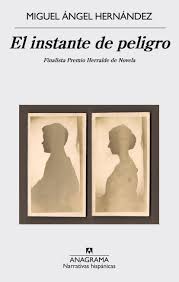
El dolor de los demás
(The Pain of Others) Gritty and honest, poised midway between a thriller and an autobiographical confession, harking back to authors such as Emmanuel Carrère, Javier Cercas and Delphine de Vigan, Miguel Ángel Hernández’s third novel is a quantum leap forward in the construction of a highly personal, solid and consistent body of work.
On Christmas Eve 1995, Miguel Ángel Hernández’s closest friend murdered his own sister, before leaping to his death from a clifftop. The events took place in a small countryhouse in Murcia’s farmlands . The motive would remain forever unknown. The case was closed and the crime was banished to oblivion. Twenty years later, when the wounds appeared to have finally healed, Hernández decides to return to the farmhouse, where, taking on the role of detective, he attempts to reconstruct the events of the tragic night on which his adolescence came to an end. But traveling back in time is a sure way of altering the past, and his investigations into his friend’s crime will awaken ghosts he thought long forgotten.
A poignant tale of when two worlds and two ways of life collide. A magnificent portrait of two eras, taking us into the heart of deepest, unknown Spain. A settling of scores with the past. But above all a finely-wrought, trenchant reflection on the ethics of literature, with the dawning realisation, as the narrator notes at one point, that “writing is not always a winning proposition, and sometimes one runs aground on the pain of others.”
“The author as host and guest in his own story. A mediation on writing, a friend who murders his sister then takes his own life, who appears out of the blue in a photograph, an investigation, a portrait of Spain in the 90s and, in short, an outstanding novel by Miguel Ángel Hernández.” Fernando Aramburu
** SAMPLE ENGLISH TRANSLATION AVAILABLE **
“It is not surprising that the author who built the marvelous architecture of Patria praises El dolor de los demás and its double narrative plan, in which the inner world of those who investigate alternates with the investigation of reality. And reality is full of ghosts.” Paolo Lepri, Corriere della Sera
“A novel of terrifying intensity, written with a distant and almost manic control of the writing, which makes it even more explosive (…) A great novel, one of the most beautiful written in the last few years, maybe in the last decades.” Dino Villatico, Gi Stati Generali
“A novel that will set a precedent and create a style. A major novel in its entire range. A novel about the pain of others and the question of whether, after all our enormously sad experiences, we can forgive. One of the best novels I’ve read in a long time, either Spanish or translated.” J. Ernesto Ayala-Dip, Babelia-El País
“A writer with a huge narrative talent. A painful and strong nostalgia that readers experience intensely.” J. A. Masoliver Ródenas, La Vanguardia
«Precious. An extension of the author’s usual battlefield: questions about representation modes, the creative power of language and imagination, or the active presence of the past in the present.» Nadal Suau, El Cultural
“A novel with the maximum human and literary interest.” Jesús Ferrer, La Razón
“Direct and brutal; no filters. A brave chronicle of the horror that “lives” next door. A trip back to an exotic and familiar world that turns out to be suffocating.” Sergio del Molino
“Memory is only a personal haze, and only through the pain of others can we understand ours. Unbeatable writing that breathes a chilling truth. Miguel Ángel Hernández has written his best book yet, which is no small feat. A must read.”Agustín Fdez. Mallo
“His best work to date. Using a memory of his past, Hernández transforms pain into literary virtue. And it was not easy.” Inés Martín Rodrigo, ABC Cultural
